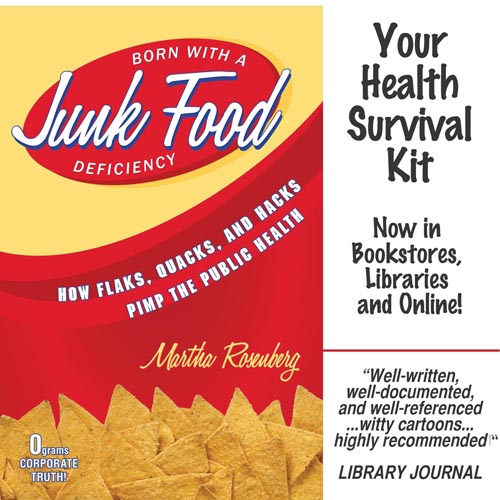
Move Over, ALEC--Big Pharma Wants to Write Laws, Too
Martha Rosenberg
Pharma is losing so much money from rising co-pays and prescription abandonment, it has launched cagey, public service announcement-sounding campaigns about "patients not taking the drugs they need," as if it is a health and not revenue issue.
::::::::
Just like ALEC, Big Pharma is doing the job of elected officials by writing legislation-ready bills for no charge, says the New York Times . The new bills seek to prevent health insurers from raising co-pay amounts to a price where patients are unable or unwilling to buy drugs, especially with expensive drugs. When co-pays rise too high, many people engage in what Pharma calls "prescription abandonment"--leaving the prescription at the pharmacy "altar" or not refilling future prescriptions.

Book now available by Martha Rosenberg
Pharma is losing so much money from rising co-pays and prescription abandonment, it has launched cagey, public service announcement-sounding campaigns about "patients not taking the drugs they need," as if it is a health and not revenue issue. Pharma has even instituted arrangements with some pharmacies to send visiting nurses to patients' homes to ensure "compliance," Big Brother overtones notwithstanding.
Prescription abandonment is an especially thorny issue for Pharma when the drugs are taken on faith, to reduce patients' "risks" and patients do not necessarily feel them working. It is also a thorny issue when studies suggest the drugs being abandoned may not be necessary to begin with or working.
One such expensive placebo is the drug known by the brand name Risperdal. The Department of Veterans Affairs spent $717 million on the drug to treat posttraumatic stress disorder in Afghanistan and Iraq troops with PTSD over nine years, only to discover it worked no better than a sugar pill! Veterans Affairs doctors wrote more than 5 million prescriptions from 2000 through June 2010 for naught, says a 2011 paper in the Journal of the American Medical Association (JAMA).
Nor was that the end of Pharma's dupe of the government, taxpayers and veterans. Less than two weeks after the JAMA study was published, the VA awarded a contract for more than 200,000 bottles of generic risperidone, said published reports, containing more than 20 million pills.
(Of course Pharma has another PSA-sounding public relations campaign going on, too: Patients are "abusing" prescription drugs! It's not the billions Pharma spends advertising drugs that causes abuse--it's patients.)
While no one wants sick people to go without their drugs, some say the Pharma-concocted bills are designed to change the debate over the cost of exorbitant drugs to coverage issues over who pays for them-- thus giving "the drug companies a free ride to charge as much as they want." Pharma is even using patient front groups to whip up a contrived demand for expensive drugs, some charge.
Patients may seem to benefit from the proposed co-pay legislation but health care costs and taxes actually skyrocket as Pharma tries to pass along the cost of expensive brand name drugs that may not even be necessary and are often less effective than cheaper drugs. Some don't work at all.
An example of how Pharma is trying to play the co-pay card for its revenue stream is seen in a recent article JAMA, called "Out-of-Pocket Medication Costs and Use of Medications and Health Care Services Among Children With Asthma." Increased co-pay is resulting in less use of the asthma "controller medications" say the authors, who have links to Pfizer, Novartis and Bristol-Myers Squibb, three large drug companies. Asthma controller medications are drugs added on top of rescue inhalers or inhaled corticosteroids like Advair, Singulair, Symbicort, and Accolate. But data published by Medco, the nation's largest pharmacy benefit manager, says the controller drugs reduce neither trips to the ER or hospitalizations when taken by a large amount of patients. Worse--some reports say the controller asthma medications actually make asthma worse.
Do we really need laws written by Pharma to help "buy" drugs that may be worthless or even make us worse? END
Martha Rosenberg's first book, Born with a Junk Food Deficiency: How Flaks, Quacks, and Hacks Pimp the Public Health, was published last week.
Submitters Bio:
Martha Rosenberg is a health reporter and commentator whose work has appeared in Consumers Digest, the Boston Globe, San Francisco Chronicle, Chicago Tribune, New Orleans Times-Picayune, Los Angeles Times, Providence Journal and Newsday. She serves as editorial cartoonist at the Evanston Roundtable. Her first book, Born With A Junk Food Deficiency: How Flaks, Quacks and Hacks Pimp The Public Health, will be published by Prometheus Books in 2012
http://www.opednews.com/populum/printer_friendly.php?content=a&id=149969
